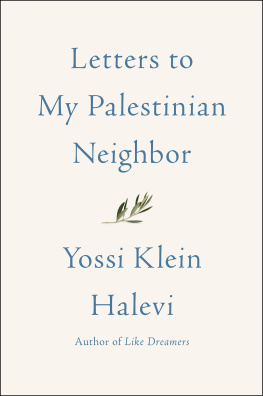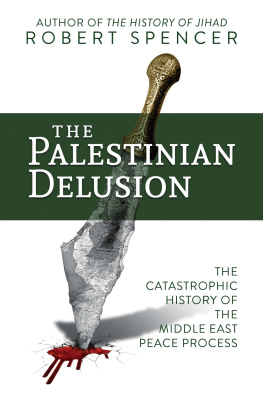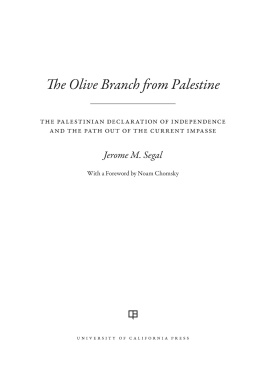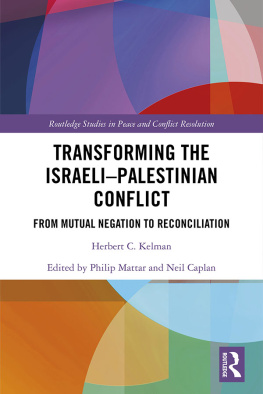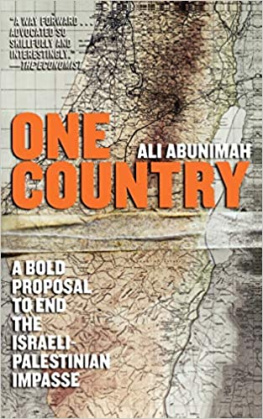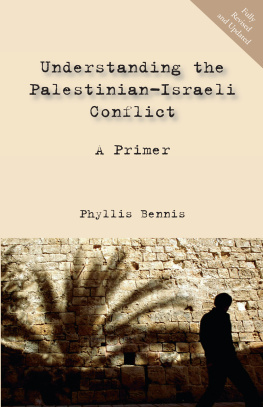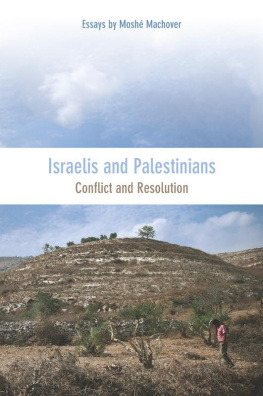Contents
For Abdullah Antepli and Michael Oren,
my partners, my brothers
For the last five years, I have been privileged to co-direct, together with Imam Abdullah Antepli of Duke University, the Muslim Leadership Initiative (MLI), an educational program teaching about Judaism and Israel to young emerging Muslim American leaders. So far MLI has brought over a hundred participants to the Jerusalem campus of the Shalom Hartman Institute, Israels preeminent center for pluralistic Jewish research and education, which sponsors MLI and where I serve as a fellow.
This book is, in part, a result of that project. Many of the issues raised in the following pages are an outgrowth of intense study sessions and informal conversations in which Ive been engaged with Imam Abdullah and my other friends in MLI.
This book is an attempt to explain the Jewish story and the significance of Israel in Jewish identity to Palestinians who are my next-door neighbors. One of the main obstacles to peace is an inability to hear the other sides story. And so I am offering this book in Arabic translation for free downloading. Here is the link: http://arblogs.timesofisrael.com/?p=219914.
I invite Palestiniansas well as others throughout the Arab and Muslim worldsto write me, at that same link, in response to any issue raised in this book. I will try to respond to every letter, no matter how challenging, that is written in a spirit of engagement. My intention is to initiate a public conversation on our shared future in the Middle East.
In a previous book, At the Entrance to the Garden of Eden, I wrote about a journey I undertook into Palestinian society. That journey was an attempt to understand something of the faith and experiences of my neighbors. This book is a kind of sequel: an attempt to explain to my neighbors something of my faith and experiences as an Israeli.
This book is an invitation to a conversation, in which both sides disagree on the most basic premises. And so I am writing to you, a Palestinian neighbor whom I dont yet know, with the hope that we may undertake a journey of listening to each other.
Letter 1
The Wall between Us
Dear Neighbor,
I call you neighbor because I dont know your name or anything personal about you. Given our circumstances, neighbor may be too casual a word to describe our relationship. We are intruders in each others dreams, violators of each others sense of home. We are living incarnations of each others worst historical nightmares. Neighbors?
But I dont know how else to address you. I once believed that we would actually meet, and I am writing to you with the hope that we still might. I imagine you in your house somewhere on the next hill, just beyond my porch. We dont know each other, but our lives are entwined.
And so: neighbor.
We live on opposite sides of a concrete wall that cuts through the landscape we share. I live in a neighborhood called French Hill in East Jerusalem, and my apartment is in the last row of houses, which you see as steplike structures built into the hillside.
From my apartment, I can just barely see the checkpoint you must crossif you have a permit at allto enter Jerusalem. But I sense the checkpoints all-pervading presence. Sometimes my early-morning routine of meditation and prayer is disrupted by the prolonged honking of frustrated drivers lining up before the checkpoint. Maybe you have been caught in that desperate line.
Sometimes I see smoke rising over your hill. Black smoke, Ive long since learned, can mean burning tires, accompanied by young people throwing rocks at soldiers. Then there is white smokesoldiers firing tear gas. How do you manage, if at all, to preserve a measure of normal life?
As a Palestinian, you are denied the rights of citizenship that I enjoy as an Israeli. The ongoing disparity between your hill and mine challenges my deepest self-understanding and moral commitments as a Jew and an Israeli. Ending that disparity is one reason why I support a two-state solution.
It is just before dawn. I am in my study, facing your hill. The muezzin calls, softly, as if reluctant to disturb the night. I wrap myself in a white prayer shawl and sit cross-legged on a meditation pillow. I touch my forehead to the ground, a nod to the call to prayer coming from across the way. In my most intimate conversation with God, I am hoping to speak to you.
A pale sun rises over the desert beyond the wall. I bind my arm with the black straps of tefillin, fasten a small black box on my forearm, facing my heart, another on my forehead. Heart and mind bound in devotion. Inside the boxes are biblical verses, including the seminal Jewish prayer proclaiming Gods oneness: Hear, Israel, the Lord our God is One. Or as the Quran puts it: He is the One God, God the Eternal, the Uncaused Cause of all being.
Clearly visible outside my window, in a far corner of the sand-colored expanse, is an incongruous patch of blue: the Dead Sea. And just beyond, the hills of Jordan. I imagine myself merging into the vastness, a part of the Middle East
But the wall restores me to reality, to the constriction just beyond my porch.
Once, before the wall was built, before so much else that went wrong, I tried to get to know you. In late 1998, in what seems like another lifetimetruly another centuryI set out on a pilgrimage into Islam and Christianity, the faiths of my neighbors in the Holy Land. I went as a religious Jew seeking not so much to understand your theology as to experience something of your devotional life. I wanted to learn how you pray, how you encounter God in your most intimate moments.
My goal was to see whether Jews and Muslims could share something of Gods presence, could be religious people together in this of all places, where Gods Name is so often invoked to justify abomination. I wanted to learn to feel at home in a mosque, to see in Islam not threat but spiritual opportunity. To hear in the muezzins call exactly what it is intended to be: a summons to awakening.
In Judaism, there is one sin for which not even the fast of Yom Kippur can atone: desecrating Gods Name. Only a religious person, misusing or acting unjustly in the Name of God, can be guilty of that offense. The interfaith encounter, I believe, sanctifies Gods Name. Interacting with believers of different faiths creates religious humility, recognition that truth and holiness arent confined to any one path. I cherish Judaism as my language of intimacy with God; but God speaks many languages.
I longed to celebrate those multiple conversations, to touch something of Gods expanse. That was my intention as I entered the world of Islam.
I was privileged to be admitted, in several mosques, into the line of devotion, joining the Muslim choreography of prayer, the immersion of the body in worship. I learned that the experience of surrender begins with the formation of the line itself, aligning shoulder to shoulder with those of your neighbor on either side. And then the sacred movement: Bow, return, prostrate, stand. Repeat: until you feel your body turning to water, a particle in a great wave of prayer that began long before your birth and will continue long after your death.
Coexistence in the Holy Land is often ensured by mutual separation. The four quarters of the Old City of JerusalemMuslim, Jewish, Christian, Armenianreinforce the message: Safety is measured by the distance between us.
My journey was a violation of the coexistence of distance, an insistence on the possibility of intimacy.
As part of my exploration of Islam, I was invited by friends to the Gaza refugee camp Nusseirat. In 1990, I had served there as a soldier, patrolling its narrow lanes. Teenagers throwing broken bottles and crowbars chanted, Amnon bsalem aleik

